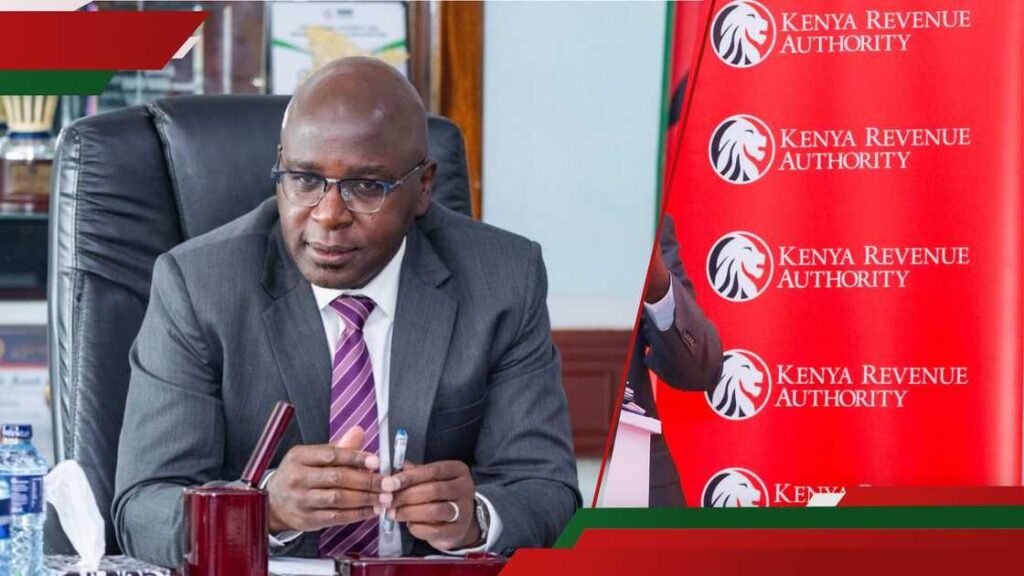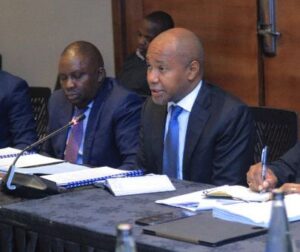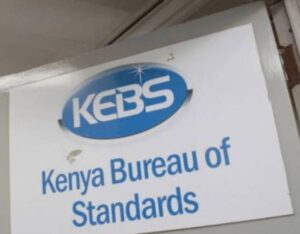
KRA Commissioner General Humphrey Wattanga. Photo | courtesy.
The Kenya Revenue Authority (KRA) has exceeded its revenue collection target for the 2024/2025 financial year, collecting Sh2.571 trillion against a target of Sh2.555 trillion. This marks a 6.8 percent year-on-year growth and a performance rate of 100.6 percent.
In a statement, KRA attributed the improved performance to a combination of strategic reforms, adoption of digital tools, targeted compliance measures, and tax base expansion efforts despite a turbulent first half of the fiscal year that saw high bank lending rates, global trade disruptions, and the shelving of the Finance Bill 2024.
Economic Backdrop
The fiscal achievement came amid moderate GDP growth of 4.7 percent, easing inflation which averaged 3.6 percent (down from 6.3 percent in 2023/24), and a strengthening Kenyan Shilling averaging Sh129.35 against the US dollar.
A 12.5 percent drop in global oil prices also led to an 11.8 percent and 12.2 percent reduction in local petrol and diesel prices respectively.
However, weak import growth of just 0.04 percent and a 2 percent drop in export values largely driven by declines in horticulture and tea put downward pressure on revenue. The private sector also experienced tight credit conditions, with lending shrinking by 1.1 percent , even as government borrowing rose by 13.9 percent .
Sectoral Revenue Highlights
Exchequer Revenue reached Sh2.323 trillion, growing by 4.5 percent, though slightly missing the Sh2.347 trillion target.
Agency Revenue outperformed expectations, collecting Sh248.276 billion against a Sh207.811 billion target a performance rate of 119.5 percent .
ALSO READ: Lack of Money Skills Keeps Many Trapped in Poverty
Domestic Taxes grew by 4.8 percent to Sh1.688 trillion, while Customs Revenue surged by 11.1 percent to Sh879.329 billion, outperforming its target by Sh48.961 billion.
Among key tax heads:
- PAYE brought in Sh560.963 billion (99 percent of target),
- Corporation Tax stood at Sh304.833 billion, up 9.9 percent,
- Domestic VAT rose 4.2 percent to Sh327.336 billion,
- Betting Taxes exceeded targets with Sh13.233 billion in Excise Tax and Sh5.7 billion in Betting Tax.
KRA also reported increased usage of adjustment vouchers to offset liabilities, totalling Sh49.673 billion double the previous year. Corporation Tax (Sh28.6 billion), PAYE (Sh10.4 billion), and VAT (Sh6.5 billion) accounted for the largest portions.
Technology and Reform Drive
KRA’s 9th Corporate Plan drove the digitisation of tax systems and reforms in taxpayer engagement. Technologies such as the Electronic Tax Invoice Management System (eTIMS) and AI-powered customs scanners have enhanced compliance, blocked leakages, and boosted efficiency.
Innovations like the Electronic Rental Income Tax System (eRITS) and GavaConnect API platform have helped KRA monitor landlord compliance and expand the tax base.
The authority also simplified VAT filings, automated customs processes, and launched customer-centric platforms like the Centralized Release Office, cutting average cargo clearance time from 110 hours to just 43.
Boosting Compliance and Expanding the Tax Net
Other major contributors to revenue growth included:
- Digital Economy Taxation, which netted Sh14.3 billion, a 32 percent increase year-on-year.
- Debt Recovery efforts yielding Sh141.3 billion from non-compliant taxpayers.
- Tax Amnesty, with 3.5 million taxpayers benefiting and Sh29 billion collected from voluntary declarations.
- Trade Facilitation through improved port operations and new clearance centres along the Northern Corridor.
- Alternative Dispute Resolution (ADR) which resolved 970 cases and released Sh15.3 billion.
Anti-Corruption Initiatives, including the iWhistle platform, helped recover Sh6.8 billion from 821 reports and led to internal staff action in 45 cases.




